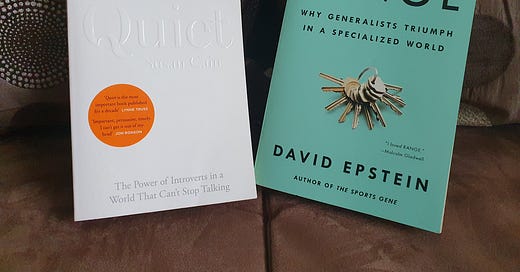DevRel Book Recommendations: "Quiet" for the Introverts and "Range" for the Generalists
I recently read "Quiet" and "Range" and could instantly draw connections between the core themes in the books and life in developer relations
I love reading, and one of the many things I enjoy about attending conferences is getting book recommendations, both from the sessions and the hallway chat. I’m fortunate enough to attend quite a few events (and I like to hang out in bookstores), and so I get a lot of recommendations. I learned about two books before the summer and managed to read them both during my travels: “Quiet: The Power of Introverts in a World That Can’t Stop Talking” and “Range: Why Generalists Triumph in a Specialized World.”
I enjoyed these books a lot, and I could instantly see the connection of the core themes to my work in DevRel. This post is a brief review of both books.

Quiet: The Power of Introverts DevRels in a World That Can’t Stop Talking
As a self-proclaimed introvert, I bought this book close to when it was initially published, as the title instantly spoke to me. For some reason, it sat on my shelf until several people mentioned it this year. I’m glad I finally got around to reading it, as it was self-affirming and offered several great tips on managing my energy.
My top three takeaways:
Introverts Have Unique Strengths: Cain emphasizes that introverts possess a range of valuable qualities, such as deep thinking, creativity, empathy, and intense focus.
Introverts Need Solitude and Restorative Environments: The book explores how introverts often thrive in environments that allow deep concentration and reflection. Understanding and creating such spaces can increase productivity and well-being for introverts.
The Power of Introvert-Extrovert Partnerships: Cain suggests that introverts and extroverts can complement each other effectively in various aspects of life, including work and personal relationships. I’ve seen this work nicely with DevRel teams and extroverted sales folks.
It’s an open secret that many of us working in DevRel are introverts. Software engineering (and tech roles in general) naturally attracts introverts who like to individually focus on solving problems and building rich internal mental models and architectures. Therefore, when folks inside and outside the tech world see engineers getting up on stage, building a brand on social media, or creating content, they assume these must be the extroverts in the community.
The reality is that being on stage allows an introvert to slip into a well-defined “speaker” role. I often build on the old cliche and joke that “I’m not an extrovert. I just play one on TV.” When presenting a talk, you are in control of the flow and exchange of information, and it can be less energy-draining than freeform Q&A on one-to-many interactions.
The book provides several useful frameworks I plan to implement during my Q4 activities. Reading this book was a great reminder of the value of balancing introvert energy-draining activities that I love, like attending conferences, with restorative activities I also love, like reading!
Range: Why Generalist [DevRels] Triumph in a Specialized World
I snagged a copy of “Range” while browsing one of my favourite bookstores, The Strand, in NYC. The book was mentioned in one of Lenny’s podcasts (unfortunately, I can’t remember which one), and then someone else recommended this at QCon New York when we were chatting in the hallways about the value of being a generalist in tech. Much like “Quiet”, I found this book very self-affirming, and I also took away a bunch of tactics and frameworks that I can use from now on.
The core theses of this book are as follows:
Delayed Specialization Leads to Success: To become excellent, Epstein suggests that you don’t specialize early in life. Experiment with many different paths. This is particularly important if you are dealing with “wicked domains” (think complex or chaotic in relation to the Cynefin framework)
Transferable Skills Are Valuable: The book argues that you will be better at innovating and more successful if you have a breadth of experience, as you can make connections between domains and take advantage of knowledge arbitrage.
Generalists Excel in a Complex World: The more expert you become in one area or niche, the more likely you will be bad at making accurate predictions about your field.
Many of the most effective DevRel folks I know are generalists. Not only can they code, write, and present, but they have also often worked in multiple fields (either before their tech careers or in hobbies and side hustles). My career has also meandered through academia, software engineering, marketing leadership, and more, and I believe I have benefited enormously from this.
This book affirmed my recommendations to explore generalising to many folks I spoke with during my summer mentoring sessions. This is an anecdote, but I encountered several folks fresh out of university/college who wanted to build a career exclusively in DevRel and focus on one tech that had caught their eye. Often, my recommendation was first to get an engineering job and explore the entire software development lifecycle and various programming languages and technologies. This will help build problem-solving capabilities, core engineering skills, and empathy with the process.
It was also great to see two folks I admire in the DevRel space, Ivan and Pauline, echo the power of generalising in response to my original tweet about reading Range.

Want more DevRel book recommendations?
I hope this post has helped to shed some light on how I draw connections between reading for fun and my day job in developer relations. Please comment below and let me know if you want more content on this topic.
I also offer ad hoc advising and fractional leadership for DevRel teams. Check the “About” page for more information.
And don’t forget to subscribe! I’m aiming to share a post every week or so.




